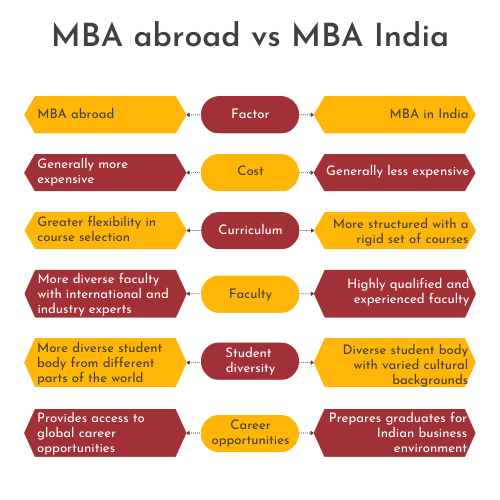MBA in India or Abroad: Navigating the Path to Business Leadership
An MBA (Masters of Business Administration) program serves as a comprehensive and valuable resource for individuals passionate about the world of business. It’s an exciting journey that dives deep into the world of management and equips you with the skills to tackle real-world challenges. Be it finance, marketing, operations, or strategy, an MBA will help you explore various facets of business. This program blends theory with hands-on experience to sharpen your critical thinking, problem-solving, and leadership abilities. An MBA program is not confined to the walls of a classroom but also expands to job, internship, and networking opportunities in the business world.
MBA is widely recognized and sought-after, not only in India but also globally. Opting to pursue an MBA is a choice that unlocks a plethora of career prospects and fosters personal development. According to Fortune India, a total of 4,03,202 students enrolled for either a postgraduate diploma in management (PGDM) or a master’s in business administration (MBA) in the year 2022. While these statistics show the increasing demand for MBA degrees, as an MBA aspirant you might often find yourself engaged in a tussle between choosing to opt for this course in India or abroad. To solve this dilemma let’s dive deep into various factors that need to be considered before choosing the right MBA program for you.
The MBA Program: Research before you decide
Thoroughly researching the targeted MBA program and school is crucial for students aspiring to pursue an MBA, whether in India or abroad. When considering studying abroad, there are exceptional schools that offer excellent course content and placement opportunities. However, it is important to note that not all MBA programs abroad are worth the high cost of tuition. The same consideration applies to MBA programs in India. Furthermore, the requirements for pursuing an MBA abroad can vary significantly depending on the country, school, and targeted program. So, before you decide whether to pursue an MBA in India or an MBA abroad, you must spend a significant amount of time researching available opportunities. In this blog whenever we refer to MBA abroad, we refer to MBAs from high-ranking business schools from all over the world.
Cost of Education
Doing an MBA from India is often less expensive than doing an MBA abroad. The living expenses, including accommodation and healthcare, may also be costlier abroad. However, the value of an international MBA lies in the exposure to diverse cultures, global business practices, and extensive networking opportunities, which can significantly enhance career prospects and open doors to international job placements with higher earning potential. Ultimately, the long-term benefits and the invaluable international experience make pursuing an MBA abroad from a good school a rewarding investment in one’s future. However, one must also be extremely careful about choosing the right college and right programs and do extensive research before applying to the college.
Eligibility
The eligibility criteria to study abroad or in India vary according to location and university guidelines. In India, an applicant to an MBA program requires a Bachelor’s degree, often with at least 50% marks from a recognised university as well as a certain cut-off in entrance test. On the other hand, if you are planning to pursue an MBA abroad you will need a bachelor’s degree with 2-6 years of experience depending on the University. In addition, some of the programs may require a GMAT/GRE score as well. Let us look at the eligibility criteria of some of the International B-schools:
| University | Eligibility |
|---|---|
| Harvard Business School | 1. Transcripts: Unless applying under the 2+2 programme, candidates must have the equivalent of a U.S. bachelor's degree from an approved institution. Please check the information for college seniors. Equivalent degrees from foreign universities that offer three-year baccalaureate degrees are recognised. 2. GMAT or GRE results 3. If you did not complete your undergraduate studies at an institution where English is the only language of instruction, you must take the TOEFL, IELTS, Pearson Test of English (PTE), or Duolingo English Test. 4. Essay and two letters of recommendation 5. A resume 6. A signed agreement with the HBS admissions policies |
| IE Business School | 1. A bachelor's degree from a university that is recognised 2. Certified translations of official university transcripts into either English or Spanish 3. CV/Resume of one page. 4. 1 essay 5. Two recommendation letters 6. For non-native English speakers, they accept the TOEFL (minimum score of 95), IELTS (minimum score of 7), Duolingo English Test (minimum score of 130), or a Cambridge Advanced or Proficiency level. If you have an English undergraduate degree, you are exempt from needing a certificate. All of the aforementioned English language certificates are valid for two years from the exam date for the IE admissions procedure. 7. A current passport photocopy 8. A passport-sized photo |
Let us discuss in detail two of the important factors in pursuing an MBA: the entrance exams and required work experience.
Entrance Exams: In the realm of MBA entrance exams in India, a few names stand out, each carrying its significance and allure. The crown jewel among these examinations is undoubtedly CAT—the Common Admission Test. Clearing this assessment with a certain cut-off, as required by the schools, will pave the way for esteemed institutions such as the Indian School of Business (ISB) and the Indian Institutes of Management (IIMs).
On the international stage, the GMAT, or the Graduate Management Admission Test has been the most popular standardized test for business school aspirants for a very long time. This test holds immense importance for students aspiring to pursue an MBA abroad. While CAT may be relatively more affordable, securing a commendable GMAT score not only opens doors to esteemed Indian business schools but also serves as a prerequisite for admission to prestigious international institutions.
When aiming to study abroad for an MBA, it is often necessary to clear the GMAT or Graduate Management Admission Test. While many programs don’t have a specific GMAT score requirement, it is advisable to aim for a score that is above the median score of admitted students in the previous year. The GMAT is widely recognized worldwide and follows a standardized format, providing access to esteemed international institutions and expanding the range of possibilities and opportunities for students on a global level. The GRE is also gaining popularity among those aspiring to attend business school. Most schools abroad that require Standardized Test scores generally accept both GMAT and GRE scores for admission to MBA programs
On the other hand, the CAT, or Common Admission Test, is specifically designed for students seeking admission to business colleges in India. As a widely recognized exam in the Indian context, the CAT provides access to esteemed Indian universities and business schools. One advantage of the CAT is its affordability compared to the GMAT, making it a favorable option for students with budget constraints or those primarily focused on pursuing their MBA within the country.
Ultimately, the choice between the GMAT and CAT depends on your aspirations and preferences. If you have ambitions of studying at renowned international institutions and are willing to invest in a global MBA experience, the GMAT can open doors to a wider range of opportunities.
Work Experience: Indian B-schools seldom require work experience as a prerequisite for MBA admission. While institutes such as ISB Hyderabad, IIM Bangalore, IIM Ahmedabad, XLRI are a few among others that prefer candidates with prior work experience, others may simply admit students with or without it. However, universities abroad admit candidates with 2-4 years of work experience. Countries such as Canada, Australia, and European countries require at least two years of experience while some of the universities of the United States might also require up to four years of work experience.
We have included some renowned business schools from abroad below, along with their work experience requirements for MBA programs. However, it is important to note that the median work experience of the admitted class in one’s target school is a better indicator of the amount of professional experience an aspiring student should have, rather than solely relying on the minimum requirement of each school.
- Harvard Business School (USA): Harvard Business School prefers candidates with significant work experience, with the average incoming class having at least 2 years of prior work experience.
- Stanford Graduate School of Business (USA): The Stanford MBA Programme does not require prior work experience for admission. Seniors in college, recent graduates, and people with various levels of job experience are all welcome to apply.
- INSEAD (France/Singapore): INSEAD typically requires applicants to have a minimum of 2 years of full-time work experience, but the average work experience of admitted students is around 5.5 years.
- London Business School (UK): London Business School usually prefers candidates with at least 3-5 years of work experience, but there is no strict minimum requirement.
- Wharton School, University of Pennsylvania (USA): Wharton typically looks for candidates with an average of 5 years of work experience, although there is no specific minimum requirement.
- Kellogg School of Management, Northwestern University (USA): There is no strict minimum work experience required
MBA Course Structure
The MBA course structure in India and abroad exhibit certain similarities and differences, reflecting the diverse educational systems and business landscapes of each region. Let’s explore the key aspects of MBA programs in both contexts.
Duration: In India, MBA programs typically have a duration of two years, divided into four semesters. On the other hand, MBA programs vary from one to two years. Some international programs offer accelerated options, allowing students to complete their MBA in a shorter timeframe. MBA programs abroad offer greater flexibility in duration, with options ranging from one to two years. This allows students to complete their degree in a shorter timeframe compared to the standard two-year programs in India. The accelerated options provided by international programs enable students to fast-track their education and enter the job market sooner.
Specializations: Be it in India or abroad, MBA programs offer a range of specializations to cater to students’ diverse interests and career aspirations. Common specializations include Finance, Marketing, Operations, Human Resources, and Entrepreneurship. However, the availability and depth of specializations may vary between institutions and countries, MBA programs abroad offer a broader range of specialized concentrations, catering to students’ diverse interests and career aspirations. With a wider selection of niche specializations available, students have the opportunity to gain specialized knowledge in their desired field, enhancing their marketability and expertise in specific industries.
Curriculum: The curriculum of MBA programs in India and abroad emphasizes a combination of core business knowledge and elective courses. Core subjects typically cover foundational subjects such as Accounting, Economics, Finance, Marketing, Strategy, Operations, and Organizational Behavior. However, the balance between theoretical concepts and practical applications may vary. International MBA programs from good schools place a greater emphasis on practical application and experiential learning. Through extensive use of case studies, experiential projects, and industry immersion, students acquire hands-on experience and develop a more practical approach to business education. This prepares them to tackle real-world challenges and make an immediate impact in their chosen careers.
Teaching Methodology: In India, MBA programs traditionally rely on lecture-based teaching methods, with a focus on theoretical concepts and classroom discussions. However, there has been a shift towards incorporating interactive sessions, case studies, group projects, and industry guest lectures. In contrast, MBA programs abroad prioritize interactive and participatory learning approaches. By engaging in case discussions, simulations, team-based projects, and experiential learning opportunities, students actively contribute to their education and develop essential skills such as critical thinking, problem-solving, and collaboration. This learner-centered approach fosters a deeper understanding of business concepts and equips students with practical skills valued by employers worldwide.
Placements and Salary
MBA programs abroad from exceptionally high-ranking business schools provide students with extensive placement and career opportunities, thanks to their global reach and connections. These international programs often have collaborations with multinational corporations, consulting firms, and renowned companies, increasing the chances of securing international job placements and internships. The exposure to diverse industries and markets enables MBA graduates to explore a wide range of career options worldwide.
When it comes to salary prospects, MBA graduates in India can expect varying average salaries based on factors such as the reputation of the business school, specialization, industry, job role, and prior work experience. For high-ranking MBA program abroad from countries such as the United States, Canada, Europe, and Australia, the average salaries for MBA graduates tend to be higher than their Indian counterparts. Based on the latest findings from GMAC’s Corporate Recruiters Survey, US companies intend to provide newly hired MBA graduates with a median starting salary of US$115,000. When considering Fortune 100 companies and the three key industries that actively seek MBA graduates: consulting, finance, and technology the median salary goes even higher. For instance, within the consulting industry, the median salary for MBA professionals is US$145,000, which is twice the median salary, earned by those with a bachelor’s degree. The higher salary potential abroad and global recognition of international MBA programs, make pursuing an MBA abroad an enticing choice for those seeking a rewarding career in the global business landscape. The exposure to diverse industries, global networks, and higher earning potential contribute to the appeal of international MBA programs, enabling graduates to secure lucrative positions and establish a strong foundation for their professional growth.
Top Universities
While India is home to several prestigious institutions offering MBA programs such as the Indian Institutes of Management (IIMs) and the Indian School of Business (ISB), the allure of pursuing an MBA abroad cannot be denied. Renowned universities such as Harvard Business School, Stanford Graduate School of Business, and INSEAD consistently rank among the top business schools worldwide. These institutions have a rich history of producing successful business leaders and entrepreneurs, with their programs designed to provide a global perspective and exposure to diverse business environments.
The following list contains the names of some of the top colleges and universities in India and abroad that are well-known for their MBA programs
Top Colleges/Universities in India
| Name | Location |
|---|---|
| IIMs | Bangalore, Calcutta, Ahmedabad, Kozhikode, Lucknow, Indore |
| Indian School of Business | Hyderabad |
| XLRI Xavier School of Management | Jamshedpur |
| SP Jain Institute of Management and Research | Mumbai |
| Faculty of Management Studies | New Delhi |
| Management Development Institute | Gurugram |
Top Colleges/Universities abroad
| Name | Location |
|---|---|
| Harvard University | USA |
| University of Oxford | UK |
| University of Toronto | Canada |
| Stanford University | USA |
| London Business School | UK |
| IE Business School | Spain |
Acceptance Rate
When it comes to the acceptance rate for MBA programs in India, prestigious institutions such as the Indian Institutes of Management (IIMs) and the Indian School of Business (ISB) are known for their rigorous selection process. With thousands of applicants vying for limited seats, the acceptance rate for these top-tier institutes is highly competitive, often ranging from 0.2% to 1.5%. The selection criteria include a combination of factors such as academic performance, entrance exam scores (such as CAT or GMAT), work experience, and performance in group discussions and personal interviews. The stringent acceptance rate reflects the high demand and limited availability of seats in these esteemed Indian business schools.
In contrast, the acceptance rates for MBA programs abroad can vary significantly depending on the university and program. While top international business schools also have competitive admissions, the acceptance rates tend to be relatively higher compared to Indian institutions. Some renowned universities abroad have acceptance rates ranging from 10% to 30%, offering a greater chance of securing admission. For instance, the acceptance rate of Harvard Business School and Stanford University was 12.5% and 6.2% in 2021. However, it is important to note that admission to these programs still requires a strong academic background, impressive standardized test scores (such as GMAT or GRE), relevant work experience, and compelling application essays. The comparatively higher acceptance rates for MBA programs abroad can provide a more accessible avenue for aspiring students to pursue their business education on an international platform.
Overall
In conclusion, pursuing an MBA abroad from a top-ranking school offers a range of advantages that can enhance your educational and career prospects. These MBA programs provide access to a diverse and multicultural learning environment, allowing you to gain a global perspective and develop cross-cultural skills that are highly valued in today’s interconnected business world. Moreover, the extensive networks and connections established by international business schools open up a wide range of opportunities for internships, job placements, and collaborations with renowned companies on a global scale. The exposure to different business practices and the chance to work with a diverse group of classmates can foster creativity, innovation, and adaptability, qualities that are highly sought after by employers in the global market. However, it is extremely important to thoroughly research the pros and cons of highly ranked schools and programs, select the most appropriate one for realizing your goals, and finally work hard to prepare a substantial profile in order to increase your chances of acceptance at the targeted schools.


